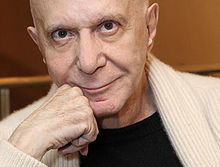Roland Petit
Roland Petit (born January 13, 1924 in Villemomble in the Seine-Saint-Denis department, northwest of Paris ; † July 10, 2011 in Geneva ) was a French dancer and choreographer of international repute.
Early career
Roland Petit, whose father ran a bistro, started dancing at the age of nine and joined the ballet school of the Ballet de l'Opéra de Paris , where the later stars Leslie Caron and Violette Verdy were among his early partners. After the war he left the opera and founded his own company in 1948, Les Ballets de Paris de Roland Petit . His most famous choreography, Carmen (1949), with Renée (Zizi) Jeanmaire in the title role, who became his wife in 1954, dates from this period . He also had a daughter with her, Valentine.
style
Petit can be assigned to the Nouvelle Vague of French dance, which turned away from the purely classical formal language. Action ballet tended to predominate for him , although he also created abstract pieces. Fantastic, fairytale elements mixed with realism in content and presentation.
His choreographies were fast-paced, funny and very effective in theater: he incorporated acrobatic elements and pantomime, for example, and used modern props that are used in everyday life. Singing performances were also interspersed. There was a cross-genre proximity to musicals and music films from the start. Petit also choreographed for equipment reviews and films such as B. Daddy Long Legs with Fred Astaire , whom he admired, and the musical Anything Goes .
Later work
In 1960, Petit turned back more to traditional stage dance when he was commissioned to direct the “Festivals populaires de ballet” at the Théâtre national de Chaillot in the Chaillot district of Paris . Petit worked with many different companies, such as the then Sadler's Wells Ballet (now the Royal Ballet ) and the Royal Danish Ballet .
From 1970 to 1975 he was the manager and owner of the Casino de Paris revue theater . In 1972 he founded the Ballet de Marseille , which he directed up to and including 1997. In 1992 a ballet school was established there. Petit published his memoir in 1993 under the title J'ai dansé sur les flots . His last work, brought on stage in 2004, which deals with his own creative process in the course of his career, is entitled Les chemins de la création . In January 2009 he celebrated a great premiere success at the Vienna State Opera with his ballet version of the bat .
collaboration
For his productions, Petit teamed up with other famous creatives: Marcel Landowski , Gabriel Yared and Henri Dutilleux wrote ballet music, a specially choreographed ballet took place with the stage participation of Pink Floyd , the fashion designers Yves Saint Laurent and Christian Dior designed costumes for him and artists like Pablo Picasso , Niki de Saint Phalle and Max Ernst created sets for his ballets. There are also big names in the librettos: Georges Simenon , Jean Anouilh and Jacques Prévert .
Works (selection)
Choreographies
- Le jeune homme et la mort (1946)
- Les forains (1948)
- Carmen (1949)
- Ballabile (1950)
- Le loup (1953)
- Notre-Dame de Paris (1965)
- Paradise Lost (1967)
- Proust, ou les intermittences du coeur (1974)
- Coppélia (1975)
- Symphonie Fantastique (1975)
- Le phantôme de l'Opéra (1980)
- Les amours de Frantz (1981)
- The Blue Angel (1985)
- Clavigo (1999)
- The chemins de la creation (2004)
Autobiography
- J'ai dansé sur les flots , Grasset, Paris 1993, ISBN 2-246-44931-6
Web links
- Roland Petit in the Internet Movie Database (English)
- Official site (French)
- cmi.univ-mrs.fr Short, tabular résumé (English)
- "Roland Petit Documental", four-part French documentary with Spanish subtitles on YouTube
Individual evidence
- ^ Choreographer Roland Petit died in Geneva , view from July 10, 2011
- ↑ Ariane Bavelier: Roland Petit, un du aristocrate ballet ; LE FIGARO, July 10, 2011 , accessed July 10, 2011
| personal data | |
|---|---|
| SURNAME | Petit, Roland |
| BRIEF DESCRIPTION | French dancer and choreographer |
| DATE OF BIRTH | January 13, 1924 |
| PLACE OF BIRTH | Villemomble , France |
| DATE OF DEATH | July 10, 2011 |
| Place of death | Geneva |
